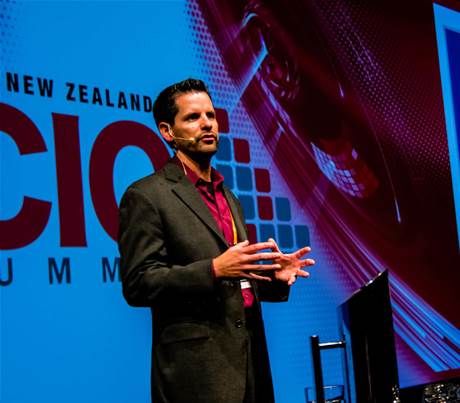The growing sea of big data is poised to make chief information officers more valuable within their company, according to Facebook's CIO.
.jpg&h=420&w=748&c=0&s=0)
Tim Campos told attendees of the annual CIO Summit in Auckland, New Zealand, that while the past decade had seen a relentless drive for cost efficiencies within the business — often hitting the CIO's bottom line — a growing need for information would become "the currency of the future".
Campos, the youngest-ever CIO of a Fortune 500 company at the age of 32, pointed to companies such as Google and his own employer Facebook as become far more valuable than their manufacturing counterparts due to the growing trend for big data.
Taming that vast of amount of data now available to corporations provided “an incredible opportunity to CIOs” to once again become relevant to the business, he said.
Where hardware, storage and computing power had become commoditised — dropping by 40 to 50 percent a year — the amount of data produced had grown inversely proportional to that.
Data had become "the new frontier”, Campos said, with CIOs poised to benefit.
However, he noted that centralised IT departments would not necessarily introduce the value required from unprocessed data. Instead, he said data scientists placed within the organisation would be able to best use the data, as they can respond directly to that particular part of the business.

Social data glut
Major organisations in the finance and other sectors have increasingly pointed to companies like Google and Facebook as a threat to traditional customer relationships, with unprecedented access to personal data allowing use for advertising and on-selling other products.
According to Campos, Google processed 24 petabytes of data every day and 20 hours of video uploaded to YouTube.
Facebook itself undoubtedly has some bragging rights; 900 million monthly active users spend 700 billion minutes on the social network.
The user base contributed a huge amount of data, Campos said: there are 120 million new friendships, two billion likes and comments, and 300 million photos uploaded every day.
The massive infrastructure to support the ten billion daily web hits daily means Facebook processes around 108 billion queries against its MySQL database.
Each day, Facebook puts over 10 terabytes of data into its Hadoop infrastructure and is able to execute queries that to go through 105 terabytes in a single query.
Facebook is able to fine-tune that data to boost its advertising, providing demographics.
"We are on the verge of being able to predict and forecast human interaction,” Campos said, citing a University of Tennessee experiment that used a supercomputer and more than 100 million news articles going back to 1945 to predict upcoming conflict using mood analysis algorithms.
When asked by the audience on security and privacy issues surrounding the social network, Campos was quick to point out that managing people’s expectations is essential.



_(28).jpg&h=140&w=231&c=1&s=0)

.png&h=140&w=231&c=1&s=0)





 iTnews Executive Retreat - Security Leaders Edition
iTnews Executive Retreat - Security Leaders Edition
 Huntress + Eftsure Virtual Event -Fighting A New Frontier of Cyber-Fraud: How Leaders Can Work Together
Huntress + Eftsure Virtual Event -Fighting A New Frontier of Cyber-Fraud: How Leaders Can Work Together
 iTnews Cloud Covered Breakfast Summit
iTnews Cloud Covered Breakfast Summit
 Melbourne Cloud & Datacenter Convention 2026
Melbourne Cloud & Datacenter Convention 2026
 The 2026 iAwards
The 2026 iAwards












_(1).jpg&h=140&w=231&c=1&s=0)



